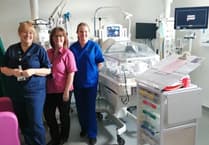People in Wales are being urged to take notice of the symptoms of leukaemia, as new research published today shows that of those who responded to the survey in this region, no one was able to identify ALL four of most widely reported symptoms - fatigue, bruising, unusual bleeding and repeated infections.
Leukaemia is a form of blood cancer that affects people of all ages and 27 people receive a leukaemia diagnosis every day in the UK – that’s just under 10,000 every year.
Overall survival for leukaemia stands at just over 50% - making it one of the most deadly forms of cancer.
Early diagnosis could saves lives, yet the recent public survey by leukaemia charities Leukaemia Care and Leukaemia UK, found that 45% of respondents from Wales could not recognise ANY amongst the four most widely reported symptoms of the disease, which kills nearly 5,000 people a year in the UK, and which is often diagnosed too late.
The two charities are collaborating on an important campaign, #SpotLeukaemia, to raise awareness of the symptoms ahead of Blood Cancer Awareness Month. Blood cancer is the fifth most common cancer and third deadliest.
In a new film, Leukaemia Care and Leukaemia UK have called on 5-year-old children to try to make the symptoms of leukaemia memorable.
The advert sees youngsters asking a range of questions to encourage people to ask ‘why’ am I feeling this way - channel your inner 5-year-old and question your symptoms which could be leukaemia.
People who are concerned about any of these symptoms - fatigue, bruising, unusual bleeding and repeated infections – are being strongly urged by the charities to contact their GP and request a blood test.
More information is available on the Spot Leukaemia website at www.spotleukaemia.org.uk.
The advert focuses on the four most widely reported symptoms.
Other symptoms of leukaemia include fever or night sweats, bone or joint pain and swollen lymph nodes.
The charities are now calling on people to start ‘asking why’ about leukaemia and its symptoms, share the video with friends and family, and visit the Spot Leukaemia website for more help and advice.
Zack Pemberton-Whiteley, Chief Executive of Leukaemia Care, said: “To hear that less than half a percent of those surveyed in the UK are able to identify the four most common symptoms of leukaemia is extremely worrying. Early diagnosis of leukaemia can improve survival.
“With just under 10,000 people being diagnosed every year with leukaemia, this shows just how important it is to continue to raise awareness of the signs and symptoms and how much work needs to be done.
“We know that our new Spot Leukaemia video may make some people laugh but in order to raise awareness of this serious subject we needed to channel our inner five-year-old and ask ‘why’.
“It's crucial that if you think you have fatigue, bruising or bleeding or repeated infections you contact your GP and ask for a blood test.
“It's that straightforward and we will keep pushing people to ask why and get what could be a crucial diagnosis.”
Fiona Hazell, Chief Executive of Leukaemia UK, said: “It’s concerning to learn that so few UK adults can correctly identify the four most common symptoms of leukaemia, or even any symptoms at all.
“Each day in the UK 27 people are diagnosed with leukaemia, and despite decades of progress, only half of leukaemia patients will live longer than five years after diagnosis.
“Spotting the signs of leukaemia and asking for that all-important blood test can make a meaningful difference in treating this disease.
“That’s why it’s even more concerning to learn that most people would not visit their GP if experiencing one or more of the four most common symptoms.
“We would encourage anyone who is concerned about leukaemia to make an appointment to request a blood test as soon as possible.”
When asked why they would not contact their GP if experiencing any unusual symptoms, 26% of UK adults who said they would not do this selected “don’t want to put additional pressure on the NHS” as their main reason, from a given list.
Long waiting times were also listed as an off-putting factor, with 23% of UK adults who said they would not visit a medical professional, citing this as their main reason, from a given list, for not getting in touch.
Leukaemia is a form of blood cancer which affects people of all ages but is most common in the over 65s. Other symptoms of leukaemia can include fever or night sweats, bone or joint pain and swollen lymph nodes.
For more information visit the Spot Leukaemia website at www.spotleukaemia.org.uk



